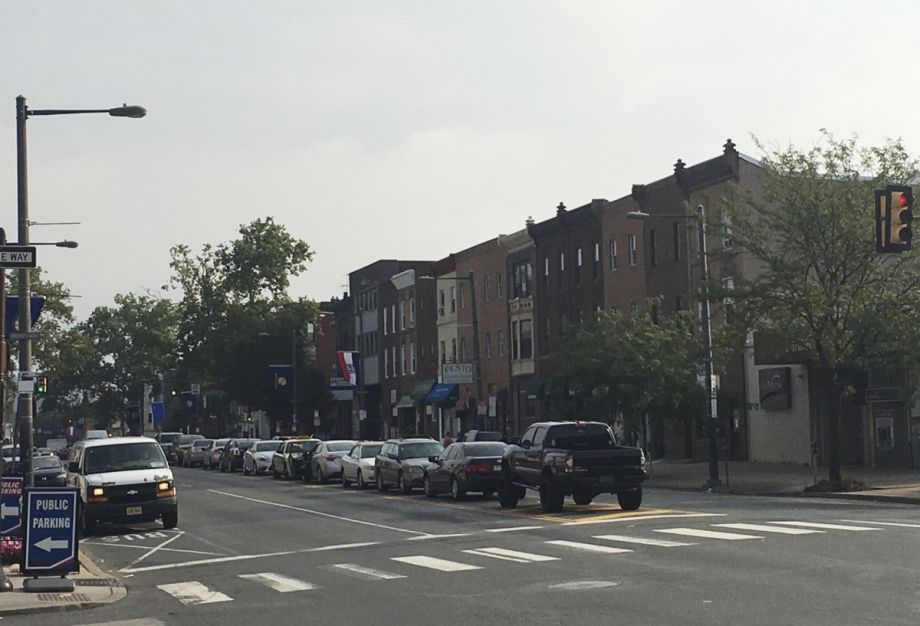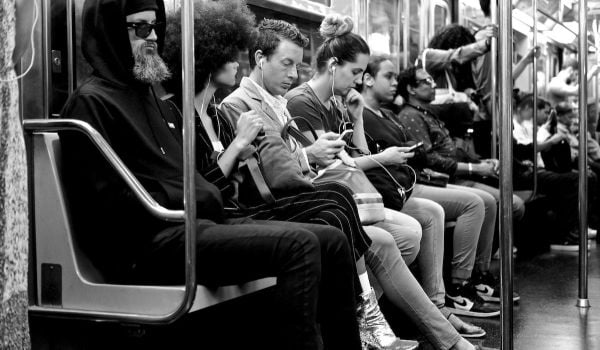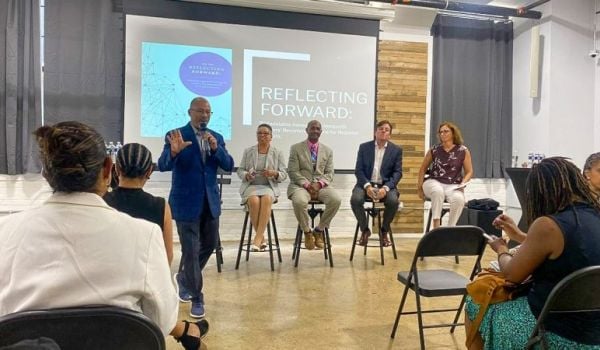In 2015, shortly before Philadelphians elected a new mayor and five new city council members, a handful of citizens formed a political action committee called 5th Square to pursue an urbanist agenda. They made a round of endorsements in the election, throwing their support behind candidates who they said would support “a better quality of life and a stronger economy via better streets, parks, transit, and land use.”
It would be a stretch to say the PAC’s support was decisive in any of those races, but in the years since the election, 5th Square has become a leading voice on urban issues in Philly, staking out positions on everything from zoning maps to bike infrastructure to the transportation authority’s transfer fees.
During last summer’s Democratic National Convention, the PAC saw an opportunity to uproot a parking habit in South Philadelphia that’s beloved by some and scorned by others.
For decades, drivers in the neighborhood have parked cars in the median along a stretch of Broad Street, the central north-south corridor in the city. The city generally tolerates the activity despite its illegality, but it did enforce no-parking rules for the convention. With the cars cleared, 5th Square launched a petition asking the city to keep up enforcement year-round, saying the parking practice was “dangerous and ugly.” The petition garnered a decent amount of support, as well as some high-pitched invective from South Philly drivers who argue there’s nowhere else to park.
The petition didn’t elicit any action from the city. So now, a year later, 5th Square is doubling down. In early July, Jake Liefer, one of the co-founders, filed a lawsuit to try to compel the city and the Philadelphia Parking Authority to enforce the law.
“We tried to work with the city on this but saw that there was no headway being made, so after a year of effort we decided to give the legal route a go,” says Liefer.
Last year, after 5th Square’s first push on the issue, Liefer says he received death threats, with someone posting his home address online and calling for his house to be firebombed. South Philadelphians have a history of lashing out at people who challenge their Wild West parking habits. Liefer expected a fresh round of attacks over the lawsuit, and indeed the controversy has reignited in predictable fashion.
“It’s about effing time. Other cities don’t tolerate this kind of lawlessness,” one commenter wrote on a story about the lawsuit.
“Then let Jake and the Neverland Hipsters move to other cities,” someone responded.
Those are tame examples. In article comments and online forums, Liefer has been called all types of names and threatened with bodily harm. But there’s also been another strain of commentary, coming from fellow urbanists who seem wary of this particular controversy.
“While I’m totally supportive of 5th Square’s agenda, I’m not sure I would have chosen this particular issue as the hill I want to die on,” wrote Jay Farrell in a Facebook chat room about urban issues.
“The problem I have with bringing this up as an issue right now is that the divide between entitled grizzled old-timers and entitled do-gooder new-comers gets exacerbated in a time when we should really be working on building bridges between them,” wrote a user who goes by the name GroJLart and authors a local architecture blog called Philaphilia.
(Both GroJLart and Farrell gave Next City permission to publish their comments.)
Philadelphia is a poor city, with struggling public schools and a strong tradition of knee-jerk opposition to change of any kind. The local urbanist agenda — focused as it is on street sharing, land use, walkability and transit improvements — is under perpetual attack from people who find it easy to caricature urbanists as privileged carpetbaggers with mixed-up priorities. Isn’t preventing gun violence more important than building bike lanes, they ask. Why don’t “they” spend their energy on improving schools?
Now, even some would-be allies are starting to back off. But of course, this is exactly how the status quo perpetuates, argues Liefer. Opposition to a longstanding practice meets intense blowback from its practitioners; political leaders don’t see any advantage in addressing it; opposition fizzles; nothing happens.
“There’s these things that are controversial that I think we can’t just dismiss,” says Liefer, who laid out his argument for why the median parking practice should end in a Philly.com op-ed. “We still need to kind of press up against those issues. We’ve tried to work with others on this and they haven’t been willing to make any headway.”
It’s true that the city hasn’t started cracking down on median parking, except to step up ticketing on cars parked in some of the crosswalks, according to officials.
“After the 5th Square petition drive last year, we told the group that if the community organizations around S. Broad supported their petition, we could work with 5th Square to address their concerns,” says Mike Dunn, a spokesman for Mayor Jim Kenney. “You’d have to ask them if they did any community outreach. We also tried to engage in a productive dialogue and asked them to suggest practical solutions for parking on Broad Street. We didn’t get a response.”
Liefer says that 5th Square reached out to seven different community groups and got mixed support. He doesn’t recall the city asking for ideas about solutions. But even that request is evidence of the city’s hands-off approach, he says.
“The Broad Street median is a microcosm for how the city has dealt with parking management,” Liefer says. “And the way that they’ve dealt with parking management has been this ad hoc, laissez-faire sort of policy which just says, ‘We’re not going to address it. You figure out a solution.’”
According to Liefer’s analysis of Pennsylvania Department of Transportation crash data, all pedestrian fatalities on South Broad Street since 2008 have occurred below Washington Avenue, where the median parking begins. One intersection on the stretch was ranked third-most-dangerous for pedestrians in a Next City analysis from 2014. Advocates argue that the line of parked cars in the middle of the street degrades visibility for drivers and pedestrians and makes turning at intersections and crossing on foot more dangerous. While the city waits for residents’ attitudes to change, the activists are absorbing all the abuse for trying to force safety improvements.
“From a tactics perspective, I think we’re trying to grasp the levers of working with others, but then recognizing as well that there’s other ways that we need to engage the city and make sure things are moving forward,” Liefer says. “The status quo is kind of the easy way to go, but we recognize that we’ve got to move forward, and to get to that is really hard.”

Jared Brey is Next City's housing correspondent, based in Philadelphia. He is a former staff writer at Philadelphia magazine and PlanPhilly, and his work has appeared in Columbia Journalism Review, Landscape Architecture Magazine, U.S. News & World Report, Philadelphia Weekly, and other publications.
Follow Jared .(JavaScript must be enabled to view this email address)
















